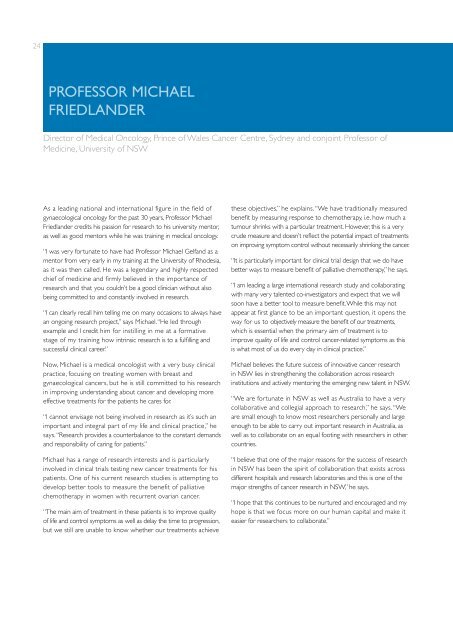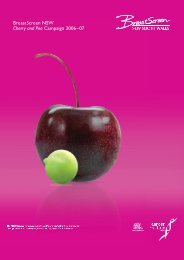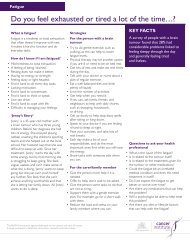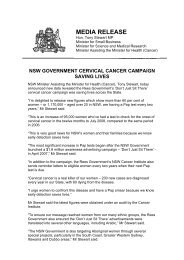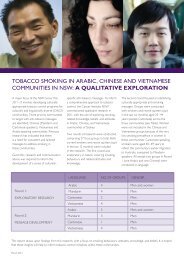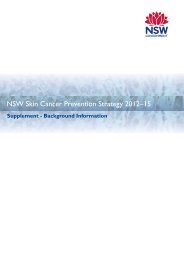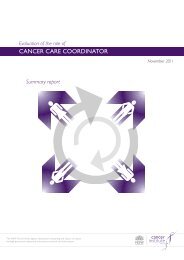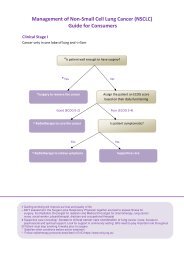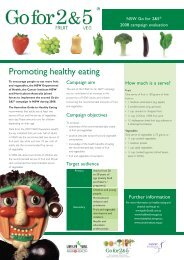NSW Research Achievements Report 2011 - Cancer Institute NSW
NSW Research Achievements Report 2011 - Cancer Institute NSW
NSW Research Achievements Report 2011 - Cancer Institute NSW
You also want an ePaper? Increase the reach of your titles
YUMPU automatically turns print PDFs into web optimized ePapers that Google loves.
24Professor MichaelFriedlanderDirector of Medical Oncology, Prince of Wales <strong>Cancer</strong> Centre, Sydney and conjoint Professor ofMedicine, University of <strong>NSW</strong>As a leading national and international figure in the field ofgynaecological oncology for the past 30 years, Professor MichaelFriedlander credits his passion for research to his university mentor,as well as good mentors while he was training in medical oncology.“I was very fortunate to have had Professor Michael Gelfand as amentor from very early in my training at the University of Rhodesia,as it was then called. He was a legendary and highly respectedchief of medicine and firmly believed in the importance ofresearch and that you couldn’t be a good clinician without alsobeing committed to and constantly involved in research.“I can clearly recall him telling me on many occasions to always havean ongoing research project,” says Michael. “He led throughexample and I credit him for instilling in me at a formativestage of my training how intrinsic research is to a fulfilling andsuccessful clinical career.”Now, Michael is a medical oncologist with a very busy clinicalpractice, focusing on treating women with breast andgynaecological cancers, but he is still committed to his researchin improving understanding about cancer and developing moreeffective treatments for the patients he cares for.“I cannot envisage not being involved in research as it’s such animportant and integral part of my life and clinical practice,” hesays. “<strong>Research</strong> provides a counterbalance to the constant demandsand responsibility of caring for patients.”Michael has a range of research interests and is particularlyinvolved in clinical trials testing new cancer treatments for hispatients. One of his current research studies is attempting todevelop better tools to measure the benefit of palliativechemotherapy in women with recurrent ovarian cancer.“The main aim of treatment in these patients is to improve qualityof life and control symptoms as well as delay the time to progression,but we still are unable to know whether our treatments achievethese objectives,” he explains. “We have traditionally measuredbenefit by measuring response to chemotherapy, i.e. how much atumour shrinks with a particular treatment. However, this is a verycrude measure and doesn’t reflect the potential impact of treatmentson improving symptom control without necessarily shrinking the cancer.“It is particularly important for clinical trial design that we do havebetter ways to measure benefit of palliative chemotherapy,” he says.“I am leading a large international research study and collaboratingwith many very talented co-investigators and expect that we willsoon have a better tool to measure benefit. While this may notappear at first glance to be an important question, it opens theway for us to objectively measure the benefit of our treatments,which is essential when the primary aim of treatment is toimprove quality of life and control cancer-related symptoms as thisis what most of us do every day in clinical practice.”Michael believes the future success of innovative cancer researchin <strong>NSW</strong> lies in strengthening the collaboration across researchinstitutions and actively mentoring the emerging new talent in <strong>NSW</strong>.“We are fortunate in <strong>NSW</strong> as well as Australia to have a verycollaborative and collegial approach to research,” he says. “Weare small enough to know most researchers personally and largeenough to be able to carry out important research in Australia, aswell as to collaborate on an equal footing with researchers in othercountries.“I believe that one of the major reasons for the success of researchin <strong>NSW</strong> has been the spirit of collaboration that exists acrossdifferent hospitals and research laboratories and this is one of themajor strengths of cancer research in <strong>NSW</strong>,” he says.“I hope that this continues to be nurtured and encouraged and myhope is that we focus more on our human capital and make iteasier for researchers to collaborate.”


